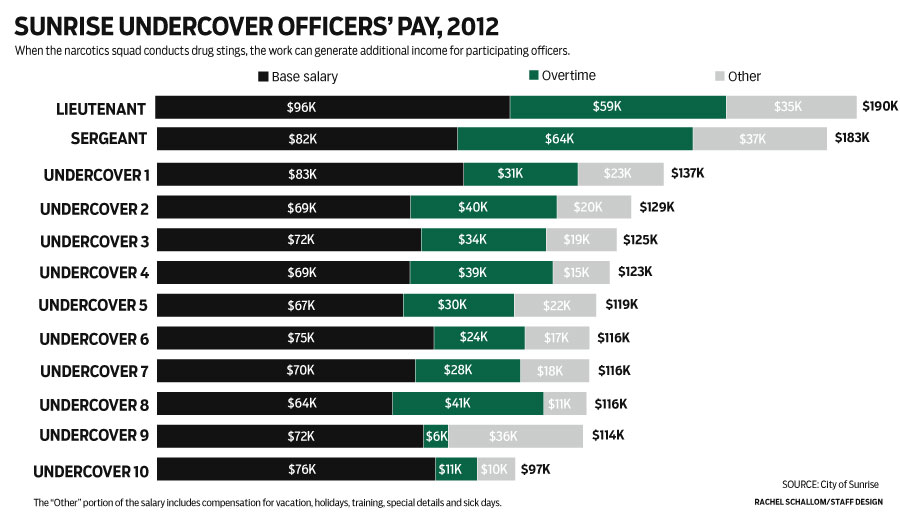Duties Of Police And Detectives
Police officers, detectives, and criminal investigators typically do the following:
- Respond to emergency and nonemergency calls
- Patrol assigned areas
- Conduct traffic stops and issue citations
- Search for vehicle records and warrants using computers in the field
- Obtain warrants and arrest suspects
- Collect and secure evidence from crime scenes
- Observe the activities of suspects
- Write detailed reports and fill out forms
- Prepare cases and testify in court
Job duties differ by employer and function, but all police and detectives write reports and keep detailed records that will be needed if they testify in court. Most carry law enforcement tools, such as radios, handcuffs, and guns.
The following are examples of types of police and detectives:
Detectives and criminal investigators are uniformed or plainclothes investigators who gather facts and collect evidence for criminal cases. They conduct interviews, examine records, observe the activities of suspects, and participate in raids and arrests. Detectives usually specialize in investigating one type of crime, such as homicide or fraud. Detectives are typically assigned cases on a rotating basis and work on them until an arrest and trial are completed or until the case is dropped.
How Much Money Do Federal Police Officers Make
Federal special agents for the FBI and other investigative agencies averaged $92,080. Federal agents receive special Law Enforcement Availability Pay and locality pay that varies with the geographic area where the agent is assigned. LEAP generally adds 25% to the agents base pay, and locality pay can add 16% to 25%.
What Is The Average Police Salary
According to the latest U.S. Bureau of Labor Statistics, the average salary for police patrol officers and detectives was $67,290 as of May 2020. The lowest 10% earned less than $39,130, and the highest 10% earned more than $113,860.
Fish and game officers, which are mostly employed at the state level, averaged $58,040 annually. Transit and railroad police came in at a median rate of $72,580.
While the average patrol officer earned $65,540, detectives and criminal investigators brought home around $86,940 per year.
Recommended Reading: How Long Do Police Have To File Charges For Dui
Homicide Detective Growth Trend
The job outlook for all police and detective positions is expected to increase by 5 percent between 2019 and 2029. This is 1 percent higher than the 4 percent expected job growth for all occupations. Since homicide detectives typically work for local police departments, job growth is likely to vary by the budget of the state or municipality and its ability to pay a homicide detective salary.
References
Earn A Bachelors Degree

While a bachelors degree in criminal justice is not required to become a police officer, it may help officers advance to higher positions in the force. To have those types of opportunities, it is key to combine skills gained from this type of degree program with comprehensive on-the-job training and experience.
Criminal justice degree programs allow students to examine crime as a social phenomenon by combining theoretical learning with field-based education. Additionally, some programs allow students to earn credits toward a bachelors degree for successfully completing police academy training. For example, Maryville Universitys online bachelors in criminal justice degree program allows students to get up to 13 credit hours for successfully completed police academy training through select academies.
Typical criminal justice coursework can include criminology theory, criminal law and procedures, multicultural policing, abnormal psychology, and more relevant subjects to help students approach detective work from a broader perspective.
Recommended Reading: Where To Get Police Report
Homicide Detective Education Requirements
The specific requirements to become a homicide detective vary by department. In general, detectives must first work as police officers. Police officers must have a high school diploma or GED. Some departments may require or give preference to applicants who have a college degree.
They are also expected to complete academy training to learn the skills necessary to fill their role as a patrol officer. This includes classes on applicable federal, state and local law, ethics and civil rights. They also receive training to use their equipment, including handguns and tasers. Other coursework may include defensive tactics, traffic control and first aid.
After they have some experience under their belt, police officers can apply for detective positions. Officers are evaluated based on their job performance, and some departments may require a written exam.
Start Your Journey To Becoming A Homicide Detective Today
A career as a homicide detective holds potential to be both exciting and rewarding because of the significant contribution homicide detectives bring to society. Each step along the path to become a homicide detective holds value. Completing police academy training can help students earn credit hours toward a bachelors degree, as well as reveal options for specialized career paths. Following training, aspiring detectives can apply their knowledge to valuable on-the-job experience, paving the way for faster, more lucrative advancement to detective work.
Find out how to get started by learning more about Maryville Universitys online criminal justice program.
Don’t Miss: Why We Need Police Reform
Will Police Salaries Increase
Police salaries are expected to grow at 5%, faster than most other occupations. As of 2020, there were 813,500 jobs in law enforcement in the U.S. Roughly 80% of those jobs were with local governments. State police agencies employed about 11%. Most police jobs are in cities with populations over 25,000. Small towns usually have less than 25 police officers.
This article, originally published October 2011, has been updated.
Nature Of The Work For Detectives And Criminal Investigators
The work of a detective and criminal investigator, sometimes referred to as an agent or special agent, involves protecting peoples lives and property while collecting evidence and gathering facts for criminal cases. A detectives job is to issue citations or warnings to individuals who break the law. Detectives will spend a lot of time writing reports or keeping records of any incidents they may come across. Detectives will also gather facts and collect evidence as well as other investigative duties.
The work of a detective depends on where you work, such as a local, State, or Federal agency as well as their occupational specialty. The duties a detective may perform in a Federal agency to enforce aspects of the law can also vary. No matter where they work, report writing and keeping detailed records are the most important part of a detectives job, especially if they are needed to testify in court.
Also known as plainclothes investigators, some detectives will be assigned to interagency task forces depending on the specific crime that needs to be combated. The work of a detective can involve examining records, conducting interviews, participating in raids or arrests, and observing suspects activities. Homicide and fraud are examples of violations as detectives will usually specialize in one type of violation. Once cases are assigned to detectives on a rotating basis, detectives will work on the case until it is either dropped or an arrest is made.
Read Also: What Kind Of Bikes Do Police Use
How Much Do Police Detectives Make In 2021
Stan T.
Police Detectives conduct investigations to prevent crimes or solve criminal cases.
Entry-level Police Detectives with little to no experience can expect to make anywhere between $46,020 to $59,620 per year or $22 to $29 per hour. Similar to any other job, their salary will increase as they gain experience.
Homicide Detective Salaries And Job Outlook
According to the Bureau of Labor Statistics , the median salary for police officers and detectives is $62,960 as of May 2017. BLS also projects employment of homicide detectives to grow 7 percent from 2016 to 2026. While a degree is not a requirement for becoming a police officer, it may significantly contribute to the progression of a law enforcement career, particularly one as a detective.
Recommended Reading: How Many Police Officers Die Each Year
S To Becoming A Detective
There are varied paths to becoming a private investigator or detective, although all paths require a steady combination of didactic instruction and on-the-job investigative experience. Here is one possible path to becoming a detective:
Step 1: Graduate from high school . At this stage, aspiring detectives are encouraged to foster skills such as critical thinking, deductive reasoning, and inductive reasoning.
Some students may choose to seek out volunteer opportunities through their local police departments, civic organizations, or federal agencies in order to get hands-on training in the field. For example, the Federal Bureau of Investigations offers the weeklong Future Agents in Training program to interested high school students. Similarly, the Bureau of Alcohol, Tobacco, Firearms and Explosives provides the Pathways Internship Program to qualified high school and college students. Students are encouraged to contact local agencies for available opportunities.
Step 2: Get a degree in criminal justice, criminology, sociology, or a related discipline . Some prospective police detectives may be eligible to enroll directly in a police academy, but many police academies require at least some college to qualify. By illustration, Eileen Carlina 20-year veteran in law enforcement and state coordinator with Rasmussen Colleges School of Justice Studiesreports that most departments want detectives who have two- to four-year college degrees.
Important Qualities For Police And Detectives

Communication skills. Police and detectives must be able to speak with people when gathering facts about a crime and to express details about a given incident in writing.
Empathy. Police officers need to understand the perspectives of a wide variety of people in their jurisdiction and have a willingness to help the public.
Good judgment. Police and detectives must be able to determine the best way to solve a wide array of problems quickly.
Leadership skills. Police officers must be comfortable with being a highly visible member of their community, as the public looks to them for assistance in emergency situations.
Perceptiveness. Officers, detectives, and fish and game wardens must be able to anticipate a person’s reactions and understand why people act a certain way.
Physical stamina. Officers and detectives must be in good physical shape, both to pass required tests for entry into the field, and to keep up with the daily rigors of the job.
Physical strength. Police officers must be strong enough to physically apprehend offenders.
Also Check: What Is The Best Police Scanner On The Market
Detectives And Criminal Investigators Overview
Detective and criminal investigators can have varied levels of education, from a high school diploma to a college degree or higher. Competition for jobs in State and Federal agencies is extremely competitive. Detective and criminal investigators who are most qualified will have the best job opportunities at police departments. The best opportunities for detective and criminal investigators will be for those who are bilingual as well as college trained in police science or with military police experience.
Skills & Personality Traits Of The Successful Detective
Most successful detectives are curious, attentive to detail, and hard-working. Additionally, perseverance may also be important, as crime-solving doesnt always happen linearly or quickly. According to the Bureau of Labor Statistics , important skills for successful detectives include:
- Communication skills: Detectives must listen carefully when interviewing witnesses, victims, and potential criminals, asking the right kind of questions and staying aware of nonverbal communication cues.
- Detectives must be able to think quickly and act calmly, particularly if someones life could be at risk or if quick action can uncover clues to solving a crime.
- Inquisitiveness: Seasoned detectives are natural-born problem solvers who possess the ability to think about possible motives for a crime and how to ascertain how crimes were committed.
- Patience: As previously stated, crime-solving can take months or years. Sometimes crimes go without resolutionsthus becoming cold caseswhich can be picked up years later, especially with advances in forensic technologies such as DNA analyses.
- Resourcefulness: Detectives must think on their feet and follow procedures at all times, but they must also be able to use the resources at hand and intuition to help in solving a crime.
You May Like: How To Be A Police Officer In Chicago
Quality Of Life For Homicide Detective
With a take-home pay of roughly $5,167/month, and the median 2BR apartment rental price of $2,506/mo**, an Homicide Detective would pay 48.5% of their monthly take-home salary towards rent.
** This rental cost was derived according to an online report at Apartment List*** Average cost of living was acquired from Numbeo’s Cost of Living Index
How Much Do Police Detectives Make In California
Do police detectives in California make a lot of money? What is the average pay for California police detectives?
According to the Bureau of Labor Statistics, police detectives in California earn an average of $107,760 a year, equivalent to $51.81 an hour.
This is 25% more than police detectives nationwide and 76% more than the typical California worker.
- Latest wage data is for May 2019
- Pre-tax earnings Wages only – does not include benefits
| Percentile |
|---|
- Data is for the entire metro area, not just the city
| Metro Area |
|---|
Also Check: How Can I Get A Copy Of My Police Report
How To Become A Homicide Detective: The Complete Guide
Learn how to become a homicide detective and read what it takes to be successful on the job.
Murder is the ultimate crime. No amount of wishing is going to bring someone back from the dead. Thats why solving murder is so important for our society, and why it takes a special person to be an effective homicide detective. Heres how to become a homicide detective and what youll do in this demanding career.
When a murder is reported, homicide detectives and the CSI unit are sent out to evaluate the crime scene. They work together to examine the scene, talk with witnesses, and check for and collect evidence. While the CSI unit, with its state-of-the-art equipment processes evidence, homicide detectives interview witnesses and suspects. The sooner detectives act on information and evidence, the better their chances of solving a murder. Effective teamwork between detectives and their CSI unit is one of the main ways that police are able to solve murders.
The homicide detective in charge of the murder scene has certain duties and responsibilities. Once you become a homicide detective, youll do, and oversee, the following tasks:
When theyre not at the scene of a crime, detectives review case files to look for clues or analyze the previous days notes.
Homicide units are set up in a variety of ways, but its common to have one or more homicide teams on a police force, supervised by a lieutenant, with each team having a sergeant in charge, and detectives working under him or her.
States Where Detectives And Criminal Investigators Earn The Least Money
The bottom-10 states where detectives and criminal investigators make the least money heavily located in the U.S. South, with two states from the Midwest. That said, the average detective salary in the lowest-paying state, South Carolina, is still slightly above the average mean wage for all occupations. Take a look at the worst-paying states for detectives.
Also Check: Can You Check Police Records Online
How Much Does A Police Detective Sergeant Make
As of Oct 27, 2021, the average annual pay for a Police Detective Sergeant in the United States is $44,726 a year.
Just in case you need a simple salary calculator, that works out to be approximately $21.50 an hour. This is the equivalent of $860/week or $3,727/month.
While ZipRecruiter is seeing annual salaries as high as $72,500 and as low as $12,000, the majority of Police Detective Sergeant salaries currently range between $31,500 to $52,000 with top earners making $64,000 annually across the United States. The average pay range for a Police Detective Sergeant varies greatly , which suggests there may be many opportunities for advancement and increased pay based on skill level, location and years of experience.
Based on recent job posting activity on ZipRecruiter, the Police Detective Sergeant job market in both Chicago, IL and throughout the entire state of is not very active as few companies are currently hiring. A Police Detective Sergeant in your area makes on average $45,785 per year, or $1,059 more than the national average annual salary of $44,726. ranks number 1 out of 50 states nationwide for Police Detective Sergeant salaries.
To estimate the most accurate annual salary range for Police Detective Sergeant jobs, ZipRecruiter continuously scans its database of millions of active jobs published locally throughout America.
Find your next high paying job as a on ZipRecruiter today.
Work Environment About This Section

Police and detectives held about 795,000 jobs in 2020. Employment in the detailed occupations that make up police and detectives was distributed as follows:
| Police and sheriffs patrol officers | 671,200 |
| Federal government | 8 |
Police and detective work can be physically demanding, stressful, and dangerous. Officers must be alert and ready to react throughout their entire shift. Officers regularly work at crime and accident scenes and encounter suffering and the results of violence. Although a career in law enforcement may be stressful, many officers find it rewarding to help members of their communities.
Some federal agencies, such as the Federal Bureau of Investigation and U.S. Secret Service, require extensive travel, often on short notice. These agents may relocate a number of times over the course of their careers. Other agencies, such as U.S. Border Patrol, may require work outdoors in rugged terrain and in all kinds of weather.
You May Like: Can I Be A Police Officer With A Misdemeanor